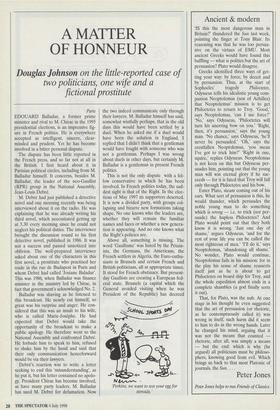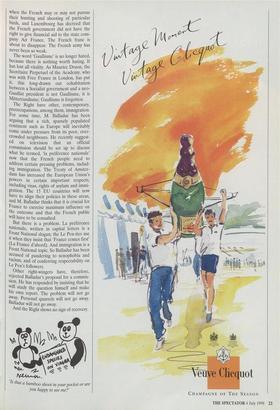A MATTER OF HONNEUR
Douglas Johnson on the little-reported case of
two politicians, one wife and a fictional prostitute
Paris EDOUARD Balladur, a former prime minister and rival to M. Chirac in the 1995 presidential elections, is an impressive fig- ure in French politics. He is everywhere accepted as intelligent, sincere, clear- minded and prudent. Yet he has become involved in a bitter personal dispute.
The dispute has been little reported in the French press, and so far not at all in the British. I first heard about it in Parisian political circles, including from M. Balladur himself. It concerns, besides M. Balladur, the leader of the neo-Gaullist (RPR) group in the National Assembly, Jean-Louis Debre.
M. Debre had just published a detective novel and one morning recently was being interviewed about it on the radio. He was explaining that he was already writing his third novel, which necessitated getting up at 5.30 every morning since he could not neglect his political duties. The interviewer brought the discussion round to his first detective novel, published in 1986. It was not a success and passed unnoticed into oblivion. The well-prepared interviewer asked about one of the characters in this first novel, a prostitute who practised her trade in the rue de Budapest in Paris and whom Debit had called `Josiane Baladur'. This was 1986, when Balladur was finance minister in the ministry led by Chirac, in fact that government's acknowledged No. 2.
Balladur was shaving as he listened to this broadcast. He nearly cut himself, so great was his surprise and anger. He con- sidered that this was an insult to his wife, who is called Marie-Josephe. He had expected that Debre would take the opportunity of the broadcast to make a public apology. He therefore went to the National Assembly and confronted Debit. He forbade him to speak to him, refused to shake him by the hand and said that their only communication henceforward would be via their lawyers.
Debit's reaction was to write a letter seeking to end this 'misunderstanding', as he put it, but his letter contained no apolo- gy. President Chirac has become involved, as have many party leaders. M. Balladur has sued M. Debit for defamation. Now the two indeed communicate only through their lawyers. M. Balladur himself has said, somewhat wistfully perhaps, that in the old days this would have been settled by a duel. When he asked me if a duel would have been the solution in England, I replied that I didn't think that a gentleman would have fought with someone who was not a gentleman. Perhaps I was wrong about duels in other days, but certainly M. Balladur is a gentleman in present French politics.
This is not the only dispute with a fel- low conservative in which he has been involved. In French politics today, the sad- dest sight is that of the Right. In the elec- tions of May 1997 its supporters deserted. It is now a divided party, with groups col- lapsing and bizarre new formations taking shape. No one knows who the leaders are, whether they will remain the familiar names and faces or whether a new genera- tion is appearing. And no one knows what the Right's policies are.
Above all, something is missing. The word `Gaullisme' was hated by the Petain- ists, the Germans, the Americans, the French settlers in Algeria, the Euro-enthu- siasts in Brussels and certain French and British politicians, all at appropriate times. It stood for French obstinacy. But present- day Gaullists are creating a European fed- eral state. Brussels (a capital which the General avoided visiting when he was President of the Republic) has decreed Perkins, we want to test your egg for steroids.' when the French may or may not pursue their hunting and shooting of particular birds, and Luxembourg has decreed that the French government did not have the right to give financial aid to the state com- pany Air France. The French franc is about to disappear. The French army has never been so weak.
The word `Gaullisme' is no longer hated, because there is nothing worth hating. It has lost all vitality. As Maurice Druon, the Secretaire Perpetuel of the Academy, who was with Free France in London, has put it, this long-drawn out cohabitation between a Socialist government and a neo- Gaullist president is not Gaullisme, it is Mitterrandisme; Gaullisme is forgotten.
The Right have other, contemporary, preoccupations, among them, immigration. For some time, M. Balladur has been arguing that a rich, sparsely populated continent such as Europe will inevitably come under pressure from its poor, over- crowded neighbours. He recently suggest- ed on television that an official commission should be set up to discuss what he termed, 'la preference nationale' now that the French people need to address certain pressing problems, includ- ing immigration. The Treaty of Amster- dam has increased the European Union's powers in certain important respects, including visas, rights of asylum and immi- gration. The 15 EU countries will now have to align their policies in these areas, and M. Balladur thinks that it is crucial for France to exercise maximum influence on the outcome and that the French public will have to be consulted.
But there is a problem. La preference nationale, written in capital letters is a Front National slogan; the Le Pen-ites use it when they insist that 'France comes first' (La France d'abord). And immigration is a Front National topic. So Balladur has been accused of pandering to xenophobia and racism, and of conferring respectability on Le Pen's followers.
Other right-wingers have, therefore, rejected Balladur's proposal for a commis- sion. He has responded by insisting that he will study the question himself and make his own report. The problem will not go away. Personal quarrels will not go away. Balladur will not go away. And the Right shows no sign of recovery.
7s that a bamboo shoot in your pocket or are you happy to see me?'















































































































 Previous page
Previous page